助动词用法归纳小学
(完整版)助动词用法及练习

be动词,情态动词,助动词do/does的用法区别及练习助动词,顾名思义就是帮助动词完成疑问及否定的,本身没有什么含义。
主要的助动词有be,do,will,have等,其用法详述如下:一、⑴由连系动词am,is,are构成的句子:变一般疑问句时把am,is,are提到句子的前面,句尾用问号即可。
变否定句时直接在am,is,are后面加not即可。
例如:肯定句:He is a student.一般疑问句: Is he a student?否定句: He is not a student.画线提问: 对he提问: Who is a student?对a student 提问: What is he?(2)was 是am,is的过去式,were是are的过去式,若句子中有以上两词时,变疑问句及否定句方法与(1)相同。
二、(1) 由情态动词can, may,will ,shall等构成的句子: 变一般疑问句时把can, may,will ,shall提到句子的前面,句尾用问号即可.变否定句时直接在can,may,后面加not即可. 例如:肯定句: She can swim.一般疑问句: Can she swim?否定句: She can not swim.画线提问: 对she提问: Who can swim?对swim提问: What can she do?(2)could,might,would,should是can,may,will,shall的过去式,若句子中有以上两词时,变疑问句及否定句方法与(1)相同。
三、(1)由行为动词构成的句子: 需要加助词do或does. 变一般疑问句时把do/does放在句子前面. 变否定句时把don’t/doesn’t放在动词的前面。
要注意观察动词的形式并对号入座。
一般疑问句和否定句的动词三单式都要变回原型。
play-----do plays-----does例如:肯定句: They play football after school. He plays football after school.一般疑问句: Do they play football after school? Does he play football after school?否定句: They don't (do not) play football after school. He doesn’t’ play football after school.画线提问: 对they/he提问: Who plays football after school?对play football提问: What do they do after school? What does he do after school?对after school提问: When do they play football? When does he play football?(2)did是do和did的过去式,变一般疑问句时把did放在句子前面. 变否定句时把didn’t 放在动词的前面, 要注意观察动词的形式并对号入座。
助动词的用法口诀
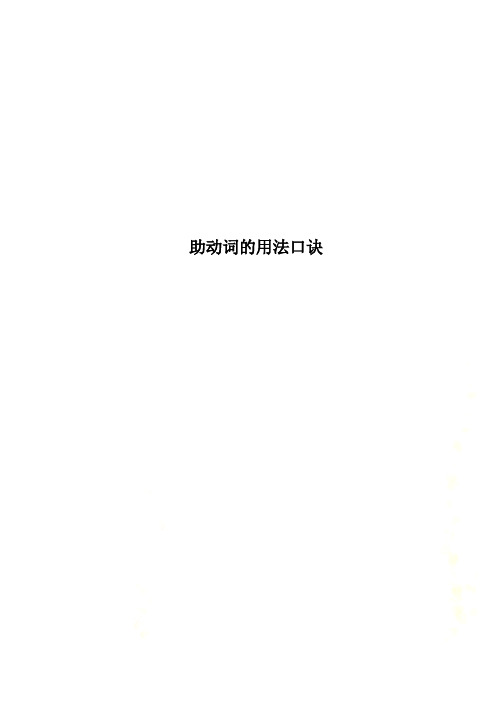
助动词的用法口诀助动词的用法口诀助动词,用法怪;只当佐料不当菜。
句型变换显身手;常与时态谈恋爱。
have完成be进行;will将来三大块。
加上各自过去式;总共构成六时态。
否定疑问靠它们;用法如同be相待。
一般现在和过去;没有助动也无碍。
否定疑问照常变;过去did,do现在。
第三人单用does;遵守be法和情态。
特殊疑问句疑问词的选用口诀如下:特殊疑问有多变;人作主语who来问。
How long用来问多久;多久一次how often。
问到钟点what time;什么时候when走前。
What does问职业;哪个which在前面。
价格多少how much;how many可数永不变。
要问地点用where;怎么让how上前线。
年龄总是how old;what colour涂颜面。
实义动词的用法口诀常接动名词的动词口诀如下:我们这样来读:动词后接ing;动词后接ing;miss错过imagine想象和practise练习。
错过想象和练习。
consider考虑enjoy享受就delay推迟;考虑享受就推迟;admit承认risk冒险去suggest建议。
承认冒险去建议。
你来appreciate欣赏我mind介意;你来欣赏我介意;finish完成save救助再keep保持。
完成救助再保持。
avoid避免forgive宽恕要deny拒绝;避免宽恕要拒绝;insist坚持resist抵抗不give up放弃。
坚持抵抗不放弃。
常接不定式的动词口诀如下:动词接“to”go去manage安排;动词接to去安排;decide决定offer提供不expect期待。
决定提供不期待。
refuse拒绝ask要求和help帮助;拒绝要求和帮助;hope希望plan计划会fail失败。
希望计划会失败。
你want要promise承诺determine决心在;你要承诺决心在;pretend假装agree同意prepare准备来。
假装同意准备来。
助动词的用法口诀
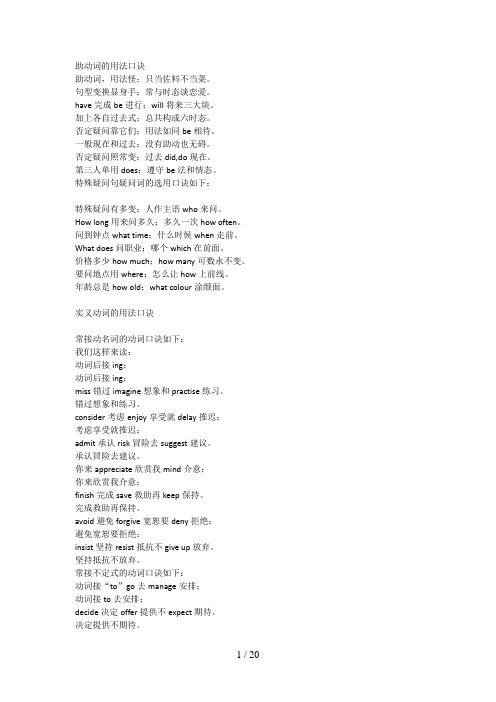
助动词的用法口诀助动词,用法怪;只当佐料不当菜。
句型变换显身手;常与时态谈恋爱。
have完成be进行;will将来三大块。
加上各自过去式;总共构成六时态。
否定疑问靠它们;用法如同be相待。
一般现在和过去;没有助动也无碍。
否定疑问照常变;过去did,do现在。
第三人单用does;遵守be法和情态。
特殊疑问句疑问词的选用口诀如下:特殊疑问有多变;人作主语who来问。
How long用来问多久;多久一次how often。
问到钟点what time;什么时候when走前。
What does问职业;哪个which在前面。
价格多少how much;how many可数永不变。
要问地点用where;怎么让how上前线。
年龄总是how old;what colour涂颜面。
实义动词的用法口诀常接动名词的动词口诀如下:我们这样来读:动词后接ing;动词后接ing;miss错过imagine想象和practise练习。
错过想象和练习。
consider考虑enjoy享受就delay推迟;考虑享受就推迟;admit承认risk冒险去suggest建议。
承认冒险去建议。
你来appreciate欣赏我mind介意;你来欣赏我介意;finish完成save救助再keep保持。
完成救助再保持。
avoid避免forgive宽恕要deny拒绝;避免宽恕要拒绝;insist坚持resist抵抗不give up放弃。
坚持抵抗不放弃。
常接不定式的动词口诀如下:动词接“to”go去manage安排;动词接to去安排;decide决定offer提供不expect期待。
决定提供不期待。
refuse拒绝ask要求和help帮助;拒绝要求和帮助;hope希望plan计划会fail失败。
希望计划会失败。
你want要promise承诺determine决心在;你要承诺决心在;pretend假装agree同意prepare准备来。
假装同意准备来。
choose选择desire渴望就promise答应;选择渴望就答应;prefer宁愿attempt尝试去care关怀。
助动词用法及练习
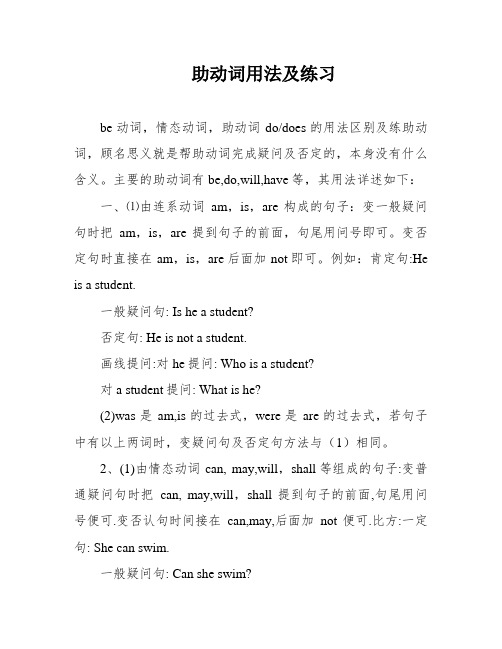
助动词用法及练习be动词,情态动词,助动词do/does的用法区别及练助动词,顾名思义就是帮助动词完成疑问及否定的,本身没有什么含义。
主要的助动词有be,do,will,have等,其用法详述如下:一、⑴由连系动词am,is,are构成的句子:变一般疑问句时把am,is,are提到句子的前面,句尾用问号即可。
变否定句时直接在am,is,are后面加not即可。
例如:肯定句:He is a student.一般疑问句: Is he a student?否定句: He is not a student.画线提问:对he提问: Who is a student?对a student提问: What is he?(2)was是am,is的过去式,were是are的过去式,若句子中有以上两词时,变疑问句及否定句方法与(1)相同。
2、(1)由情态动词can, may,will,shall等组成的句子:变普通疑问句时把can, may,will,shall提到句子的前面,句尾用问号便可.变否认句时间接在can,may,后面加not便可.比方:一定句: She can swim.一般疑问句: Can she swim?否定句: She can not swim.画线提问:对she提问: Who can swim?对swim提问: What can she do?(2)could,might,would,should是can,may,will,shall的过去式,若句子中有以上两词时,变疑问句及否定句方法与(1)相同。
三、(1)由行为动词构成的句子:需要加助词do或does.变一般疑问句时把do/does放在句子前面.变否定句时把don’t/doesn’t放在动词的前面。
要注意观察动词的形式并对号入座。
一般疑问句和否定句的动词三单式都要变回原型。
play-----doplays-----does比方:肯定句: XXX.一般疑问句: Do they play football after school?Does he play football after school?否定句: They don't (do not)play XXX.画线提问:对they/he提问: XXX?对play football提问: What do they do after school? What does he do after school?对after school提问: When do they play football? When does he play football?(2)did是do和did的过去式,变一般疑问句时把did放在句子前面.变否定句时把didn’t放在动词的前面,要注意观察动词的形式并对号入座。
小学生助动词的用法

小学生助动词的用法小朋友们,在我们学习语文的过程中,会遇到很多有趣的词语,其中助动词就是非常重要的一部分。
那什么是助动词呢?助动词呀,就是帮助主要动词构成各种时态、语态、语气等的词。
今天咱们就一起来学习一下小学生常见的助动词用法。
常见的助动词有“会”“能”“要”“应该”“敢”“愿意”等等。
先来说说“会”这个助动词。
“会”表示有能力或有可能做某事。
比如说,“我会唱歌”,这里的“会”就表明“我”有唱歌的能力。
再比如,“明天会下雨”,这表示有可能发生下雨的情况。
“能”也是一个很常用的助动词。
它强调具备某种能力或条件可以做到某事。
比如,“他能跑得很快”,说明他有跑得快的能力。
“我能自己完成作业”,意味着我有自己完成作业的条件和能力。
“要”这个助动词呢,有多种意思。
它可以表示打算、计划做某事,像“我要去公园玩”,就是说我有去公园玩的打算。
“要”还能表示请求或命令,比如“你要认真听讲”。
“应该”表示情理上必然或必须如此。
比如,“我们应该尊敬长辈”,这是从道理上讲必须要做的。
“敢”表示有胆量去做某事。
“他敢一个人走夜路”,说明他有这个胆量。
“愿意”则侧重于表达内心的想法和态度,表示情愿、乐意做某事。
例如,“我愿意帮助你”,表示我内心是乐意提供帮助的。
助动词在句子中的位置也有一定的规律哦。
一般来说,助动词会放在主语之后,主要动词之前。
比如,“小明会画画”,“会”就在“小明”之后,“画画”之前。
那助动词在不同的句子中又有什么样的变化呢?当主语是第三人称单数时,助动词也要相应地发生变化。
比如,“他能跑”,但如果主语变成“她”,就要说“她能跑”,助动词“能”是不变的。
咱们再通过一些例子来巩固一下助动词的用法。
“我要好好学习,将来成为一个有用的人。
”这里的“要”就表达了我的决心和打算。
“同学们应该遵守纪律,保持教室安静。
”“应该”强调了遵守纪律是必须的。
小朋友们,在使用助动词的时候,一定要根据具体的语境和想要表达的意思来选择合适的助动词哦。
小学英语语法专题讲解---助动词的用法
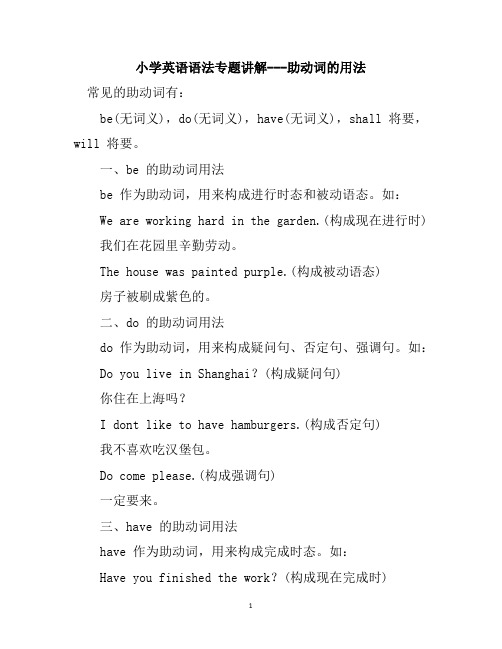
小学英语语法专题讲解---助动词的用法
常见的助动词有:
be(无词义),do(无词义),have(无词义),shall 将要,will 将要。
一、be 的助动词用法
be 作为助动词,用来构成进行时态和被动语态。
如:
We are working hard in the garden.(构成现在进行时) 我们在花园里辛勤劳动。
The house was painted purple.(构成被动语态)
房子被刷成紫色的。
二、do 的助动词用法
do 作为助动词,用来构成疑问句、否定句、强调句。
如:Do you live in Shanghai?(构成疑问句)
你住在上海吗?
I dont like to have hamburgers.(构成否定句)
我不喜欢吃汉堡包。
Do come please.(构成强调句)
一定要来。
三、have 的助动词用法
have 作为助动词,用来构成完成时态。
如:
Have you finished the work?(构成现在完成时)
你的工作完成了没有?
四、shall 和 will 的助动词用法
shall 和 will 作为助动词,用来构成将来时态。
如:I will call you this evening.(构成一般将来时) 今晚我会打电话给你。
What shall we do next week?
下个星期我们做什么?。
助动词用法讲解
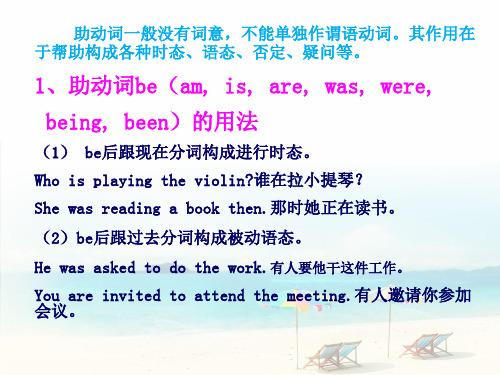
④表示可能性,与情态动词may, can同义。 Such books are to be found in any library. 这种书任何图书馆都有。 Not a sound was to be heard.一点声响也没有。 ⑤表示后来发生的事,可以用来表示命运或注定
They say good-bye, little knowing that they were never to meet again. 他们告别了,没想到再也不能相见了。 He was to regret the decision.他有一天会后悔 做出这一决定的。 ⑥用于习语 Where am I to go? 我该向何处去? What am I to do? 我该怎么办?
3、do(does, did) 的用法
(1)构成疑问句或否定句 How did you know about it?你是怎样知道这件事的。 He does not smoke. 他不抽烟。 (2)加强语气。 He did tell that.他的确告诉了此事。 Do come and see us.一定来看我们。 (3)代替前面刚出现的动词,避免重复。 -You like popular music, don't you?你喜欢流行音乐,是吧? -Yes , I do.是的,我喜欢。 He speaks French as fluently as she does.他讲法语和她讲的一样流利。
(4)用于倒装句中。 Never did he pay attention to my words.他从不注意我的话。 Only then did I understand the importance of English. 只是那时,我才了解到英语的重要性。 (5)构成否定的祈使句。 Don't be so careless.不要那么粗心。 Do not hesitate to come for help.只管来求助。
助动词的用法口诀
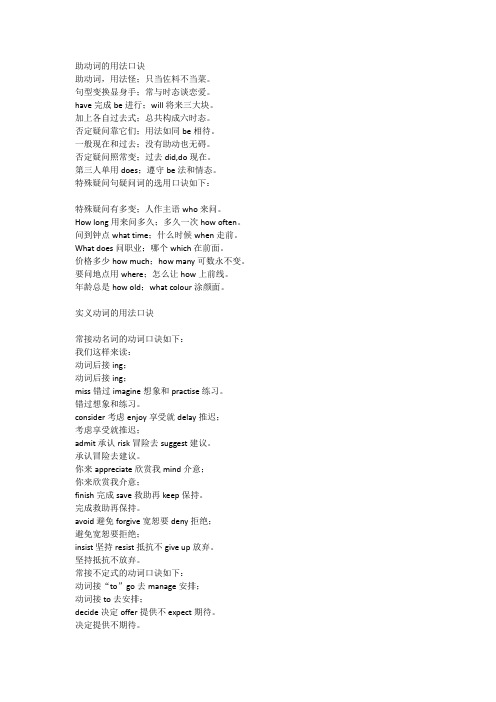
助动词的用法口诀助动词,用法怪;只当佐料不当菜。
句型变换显身手;常与时态谈恋爱。
have完成be进行;will将来三大块。
加上各自过去式;总共构成六时态。
否定疑问靠它们;用法如同be相待。
一般现在和过去;没有助动也无碍。
否定疑问照常变;过去did,do现在。
第三人单用does;遵守be法和情态。
特殊疑问句疑问词的选用口诀如下:特殊疑问有多变;人作主语who来问。
How long用来问多久;多久一次how often。
问到钟点what time;什么时候when走前。
What does问职业;哪个which在前面。
价格多少how much;how many可数永不变。
要问地点用where;怎么让how上前线。
年龄总是how old;what colour涂颜面。
实义动词的用法口诀常接动名词的动词口诀如下:我们这样来读:动词后接ing;动词后接ing;miss错过imagine想象和practise练习。
错过想象和练习。
consider考虑enjoy享受就delay推迟;考虑享受就推迟;admit承认risk冒险去suggest建议。
承认冒险去建议。
你来appreciate欣赏我mind介意;你来欣赏我介意;finish完成save救助再keep保持。
完成救助再保持。
avoid避免forgive宽恕要deny拒绝;避免宽恕要拒绝;insist坚持resist抵抗不give up放弃。
坚持抵抗不放弃。
常接不定式的动词口诀如下:动词接“to”go去manage安排;动词接to去安排;decide决定offer提供不expect期待。
决定提供不期待。
refuse拒绝ask要求和help帮助;拒绝要求和帮助;hope希望plan计划会fail失败。
希望计划会失败。
你want要promise承诺determine决心在;你要承诺决心在;pretend假装agree同意prepare准备来。
假装同意准备来。
choose选择desire渴望就promise答应;选择渴望就答应;prefer宁愿attempt尝试去care关怀。
- 1、下载文档前请自行甄别文档内容的完整性,平台不提供额外的编辑、内容补充、找答案等附加服务。
- 2、"仅部分预览"的文档,不可在线预览部分如存在完整性等问题,可反馈申请退款(可完整预览的文档不适用该条件!)。
- 3、如文档侵犯您的权益,请联系客服反馈,我们会尽快为您处理(人工客服工作时间:9:00-18:30)。
助动词用法归纳小学 -CAL-FENGHAI-(2020YEAR-YICAI)_JINGBIAN助动词(Auxiliary Verb):协助主要动词构成谓语动词词组的词。
自身没有词义,不可单独使用。
主要动词(Main Verb):是被协助的动词,构成时态和语态。
He doesn't like English. 他不喜欢英语。
(doesn't是助动词,无词义;like是主要动词,有词义)最常用的助动词有:be, have, do, shall, will, should, would 等。
基本助动词只有三个:be, do, have他们没有词汇意义,只有语法作用,如协助构成进行时,完成时,被动态,否定句,疑问句等。
一、be 动词的用法既可作系动词,又可作助动词,做助动词有人称和数的变化,第一人称用am,第二人称及复数用are,第三人称及单数用is, am,is 过去式为was, are的过去式为were,它与现在分词构成进行时态和过去分词一起构成被动语态。
a. 表示时态 be+doing(现在分词)表示现在进行的动作He is singing. 他正在唱歌。
b. 表示语态 be+done(过去分词)表被动语态He was sent to England. 他被派往英国。
c. be+to do(动词不定式)表示计划安排命令。
We are to plant trees next week. 下周我们将要去植树。
You are to explain this 。
对此你要做出解释。
二、do的用法Do主要帮助实意动词构成否定和疑问句,后跟动词原形,有时放在实意动词前起强调作用,还可代替前文出现的动词,避免重复。
Do 有人称和数的变化,第一、二人称及复数用do,第三人称及单数用does,过去式为did。
1)构成一般疑问句。
DO +主语+动词原形 +其他I like singing 变为疑问句为 Do you like singing2)do + not 构成否定句。
主语+do +not +动词原形。
I do not want to be criticized.我不想挨批评。
He doesn't like to study.他不想学习。
Many students didn’t know the importance of English before. 过去好多学生不知道英语的重要性.3) 构成否定祈使句。
Don't go there.不要去那里。
Don't be so absent-minded.不要这么心不在焉。
说明:构成否定祈使句只用do,不用did和does。
4)放在动词原形前,加强该动词的语气。
Do come to my birthday party please.请一定来参加我的生日宴会。
I did go there.我确实去那儿了。
I do miss you.我确实想你。
我真想你了!5)用作代替动词。
---- Do you like Beijing? --你喜欢北京吗?---- Yes, I do. No,I don’t. --是的,喜欢。
(do用作代动词,代替like Beijing.)He knows how to drive a car, doesn't he? 他知道如何开车,对吧?三、have 的用法Have+过去分词构成完成时态I have studied english for a long time .情态动词的基本用法归纳情态动词有can (could), may (might), must, have to, shall (should, will (would), dare (dared), need (needed), ought to等。
情态动词无人称和数的变化;不能单独使用,必须与其后的动词原形构成谓语。
一、 can, could1) 表示能力Mary can speak three languages.Can you skate?此时可用be able to代替。
Can只有一般现在时和一般过去式;而be able to则有更多的时态。
I’ll not be able to come this afternoon.当表示“经过努力才得以做成功某事”时应用be able to,不能用Can。
如:He was able to go to the party yesterday evening in spite of the heavy rain.2) 表示请求和允许。
-----Can I go now?----- Yes, you can. / No, you can’t.此时可与may互换。
在疑问句中还可用could,might代替,不是过去式,只是语气更委婉,不能用于肯定句和答语中。
---- Could I come to see you tomorrow?---- Yes, you can. ( No, I’m afraid not. )3) 表示推测(惊讶、怀疑、不相信的态度),用于疑问句、否定句和感叹句中。
Can this be true?This can’t be done by him.How can this be true?二、 may, might1) 表示请求和允许。
might比 may语气更委婉,而不是过去式。
否定回答时可用can’t或mustn’t,表示“不可以,禁止”。
----Might/ May I smoke in this room?---- No, you mustn’t.---- May/Might I take this book out of the room?---- Yes, you can. (No, you can’t / mustn’t. )用May I...征徇对方许可时比较正式和客气,而用Can I...在口语中更常见。
2)用于祈使句,表示祝愿。
May you succeed!3) 表示推测、可能性(不用于疑问句)。
might不是过去式,它所表示的可能性比may小。
1.He may /might be very busy now.2.Your mother may /might not know the truth.三、 must, have to1) 表示必须、必要。
You must come in time.在回答引出的问句时,如果是否定的,不能用mustn’t(禁止,不准),而用needn’t, don’t have to(不必).---- Must we hand in our exercise books today?---- Yes, you must.---- No, you don’t have to / you needn’t.2) must是说话人的主观看法,而have to则强调客观需要。
Must只有一般现在时, have to 有更多的时态形式。
1.he play isn’t interesting, I really must go now.2. I had to work when I was your age.3) 表示推测、可能性(只用于肯定的陈述句)1.You’re Tom’s good friend, so you must know what he likes best.2. Your mother must be waiting for you now.四、 shall, should1)shall +动词原形表示将来时态Shall we go shopping tomorrow?2) shall 用于第一人称,征求对方的意见。
What shall we do this evening?shall 用于第二、三人称,表示说话人给对方的命令、警告、允诺或威胁。
1. You shall fail if you don’t work hard.(警告)2. He shall have the book when I finish it.(允诺)3. He shall be punished.(威胁)六、 will, would1) 表示请求、建议等,would更委婉。
Would you like a cup of coffee 你想要一杯咖啡吗?2)will +动词原形表将来时态He will come back next month . 他下个月将会回来。
3)表示意志、愿望和决心。
1. I will never do that again.助动词练习题1 把下列句子变为一般疑问句。
1.It is a lovely dog.________________________________________ 2.She is lovely girl.________________________________________ 3.We are classmates.______________________________________ 4.I am a doctor.________________________________________ 5.There is a bird in the tree.________________________________6.They are good friends.____________________________________7.I love my parents._______________________________________ 9. We have a pleasant home._______________________________10.They go to church on Sunday._____________________________11.You are a singer.______________________________2. 用do does be 填空1> _____ she know all the answersYes , she ____ . No, she _____.2> _____ the twins often fightYes ,_____ do. No, _____ don’t.3> _____ your dad like listening to musicYes ,____ does . No, _____ doesn’t.5> _____ you have a new teacherYes , I ______. No, I ______.6> _____ she a teacherYes, she _____ . No, she _____.10> _____ your father smoking in the living roomYes, ____ is .No, he _____.助动词和情态动词专项练习一、情态动词的基本用法⒈Can John Smith ______ his homework on time?A. finishB. finishesC. finishingD. finished⒉She dare ______ out by herself at night.A. go notB. not to goC. to not goD. not go⒊You ______ to the party tonight if you have something important to do.A. don’t need comeB. needn’t to comeC. needn’t comeD. don’t need coming⒋—We’ll be ready to leave at eight.—Well, John must ______ back by then.A. beingB. isC. beD. to be⒌Your grandmother ______ the newspaper without glasses.A. can still readB. cans still readC. still can readsD. can still reads二、must, need, dare的用法⒍—Must I get up early tomorrow, Dad?—No, you _____. Tomorrow is Sunday.A. can’tB. mustn’tC. needn’tD. couldn’t⒎—Must we finish the book today?—Yes, you ______.A. canB. mayC. needD. must⒏You ______ play on the road. It’s dangerous.A. mustn’tB. mayC. canD. must⒐You ______ return the book now. You can keep it until next week.A. can’tB. mustn’tC. needn’tD. dare not⒑I ______ a sleeping bag because I’ve already got one.A. needn’t haveB. didn’t haveC. don’t needD. need not⒒Mr Smith ______ a pen from Jack.A. must to borrowB. had borrowedC. must borrowedD. had to borrow三、can, could, may, might的用法⒓The man ____ walk fast because he is lame in the right foot.A. mustB. mustn’tC. canD. can’t⒔—Could I borrow your dictionary?—Yes, of course you ______.A. willB. wouldC. mustD. can⒕A computer _____ think for itself, it must be told what to do.A. might notB. may notC. couldn’tD. can’t⒖—That must be a mistake.—I don’t think so. It ______ a mistake.A. may be notB. needn’t beC. cannot be⒗He ______ help crying at the news of his father’s death.A. couldn’tB. shouldn’tC. hadn’tD. didn’t⒘“Now, ______ all smile, please?” he asked.A. may youB. do youC. shall youD. can you⒙I haven’t brought my dictionary with me. _____ I use yours?A. MustB. ShallC. MayD. Need四、should, would, shall, will的用法⒚—Must I copy the new words in class?—No, you ______. You ______ do it at home.A. needn’t, mayB. mustn’t, mustC. mustn’t, mayD. needn’t, mustn’t⒛—Would you please not draw pictures on the wall?—Sorry. I ______ it again.A. am not doingB. don’t doC. didn’t doD. won’t do21.______ I open the windowIt’s so warm here.A. ShallB. WillC. WouldD. Must22.______ you like some oranges?A. WouldB. CanC. MayD. Must23.Tom said that he ______ apologize to Mary.A. wouldB. willC. shallD. is going to24.“Do you think we ______ turn back?” Jane asked.A. shallB. willC. shouldD. would⒈He ______ any help. He can do it all by himself.A. needs notB. needn’tC. doesn’t needD. doesn’t need to ask⒉Li Fang isn’t in the classroom. He ______ be at the library. Let’s go and find him.A. canB. mustC. needD. should⒊—May I have a look at your new watch—Yes, you ______.A. canB. mustC. needD. should⒋—Must I hand in the exercise book tomorrow—No, you______. You can hand it in the day after tomorrow.A. can’ tB. mustn’tC. needn’tD. couldn’t⒌There ______ an English test next Monday.A. maybeB. wasC. may beD. may⒍You’d better ask someone, or you______ get lost.A. mayB. mustn’tC. are going toD. can7.“Come on!” Peter called. “We ______ stay here any longer.”A. couldn’tB. can’tC. hadn’t toD. mightn’t8..Must Tom write it now No, he ______.A. needn’tB. can’tC. mustD. mustn’t9.“Have you seen Li recently?”“No, I think he must ______ away on vacation.”A. beingB. isC. beD. to be10.“All right. You ______ if you don’t want to.”A. don’t need stayB. needn’t stayC. needn’t to stayD. don’t need staying 1:She ________ to see documentaries(记录片).A、do wantB、 don't wantC、doesn't wantD、not want2:Look at that picture on the wall. __________ you like itA、DoB、CanC、CouldD、Are3:He ________ like pears.A、 doB、isC、doesn'tD、not4:—Do you often go to the cinema______ Sunday?—No, we__________.A、on, don'tB、on, aren'tC、in, doD、in, don't5:-Can you see a light on the table?-Yes, ________.A、I amB、I’m notC、I canD、He isn’t6:—Does the boy want to be an actor? —________.A、 Yes, he isB、No, he doesC、Yes, he doesD、No, he isn't7:_________ he have any applesA、DoB、DoesC、IsD、Are8:She ______ want to be a policewoman, because she thinks it’s kind of dangerous.A、isn’tB、aren’tC、don’tD、doesn’t9:Why____he have brown hairA、 doB、doesC、isD、has10:What time__________ he get home every dayA、isB、doesC、doD、am11:What________ you see in the pictureA、isB、areC、canD、have12:Jack_______ like flying kites______ throwing a frisby.A、don't, orB、doesn't, andC、 don't, andD、doesn't, or13:A:________ Jim ________ a ball?B:No, he________.A、Do, have, don'tB、Does, has, doesn'tC、Is, have, isn'tD、Does, have, doesn't14:I ________ have a watch.A、 am notB、doesC、don'tD、doesn't15:____you____a good time on your vacationA、Did; haveB、Did; hadC、Were; haveD、Were; had16:Simon likes _____ football, but he doesn’t _____ it well.A、 play, playsB、to play, playsC、plays, playingD、playing, play 17:She____have to wash the dishes now.A、don'tB、notC、doesn'tD、can't18:—________Colin ________ Chinese history? —Yes, he does.A、Do; likeB、Does; likesC、Do; likesD、Does; like19:Li Lei ______ lunch at home.A、hasn’tB、haven’tC、don’t haveD、doesn’t have20:-Who cleaned the blackboard yesterday, Dick? -John___.A、cleanedB、doesC、didD、is21:__________ you usually come to school by bikeA、Don'tB、Doesn'tC、Aren'tD、Isn't22:-Where______lions come from? -I think they come from Africa. A、are B、is C、does D、do23:__________ we have any eggsA、Aren'tB、Don'tC、Can'tD、Mustn't24:____you on your vacation yesterdayA、AreB、WereC、WasD、Did25:-Who____dinner last night? -My mother____.A、cooked; didB、did; cookedC、did; didD、cooked; cooked1.There __________ a meeting tomorrow afternoon.A. will be going toB. will going to beC. is going to beD. will go to be2. Mother ________ me a nice present on my next birthday.A. will givesB. will giveC. givesD. Give3.Listen! The girl _____________ in the room.A. singsB. singingC. is singingD. are singing4.What are you doing I’m __________ TV.A. watchB. watchesC. to watchD. Watching5.In our school there are fifty-five ___.A women teachers B. woman teachers. C women teacher D. woman’s teacher6.Jack went to have two ___ pulled out yesterday afternoon.A. toothsB. toothC. teethD. Toothes7.Many ____ have been built in our city since 1987.A. factorysB. factoriesC. factoryesD. factorys8.Who's that at the door ____ is the postman.A. SheB. ThisC. ItD. He9. you go to the movies yesterday?A.DoB.DidC..DoesD.Have。
